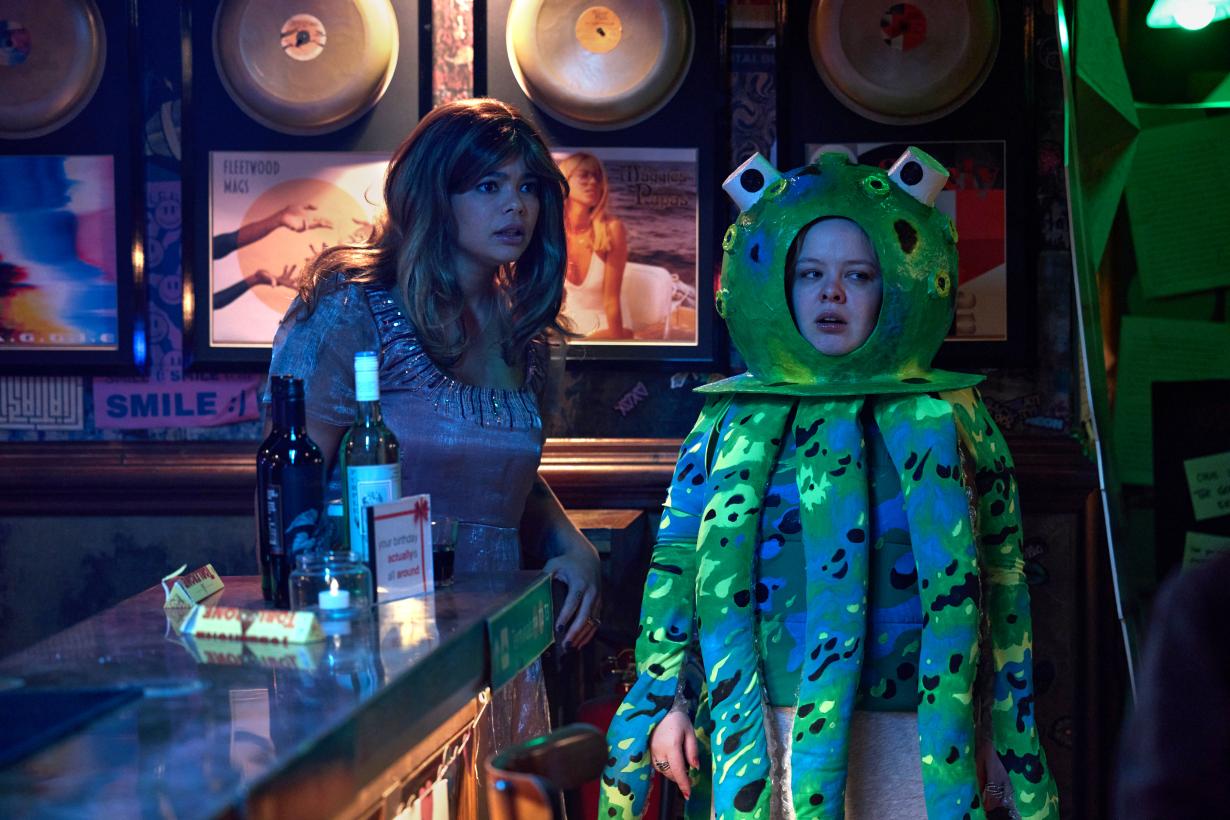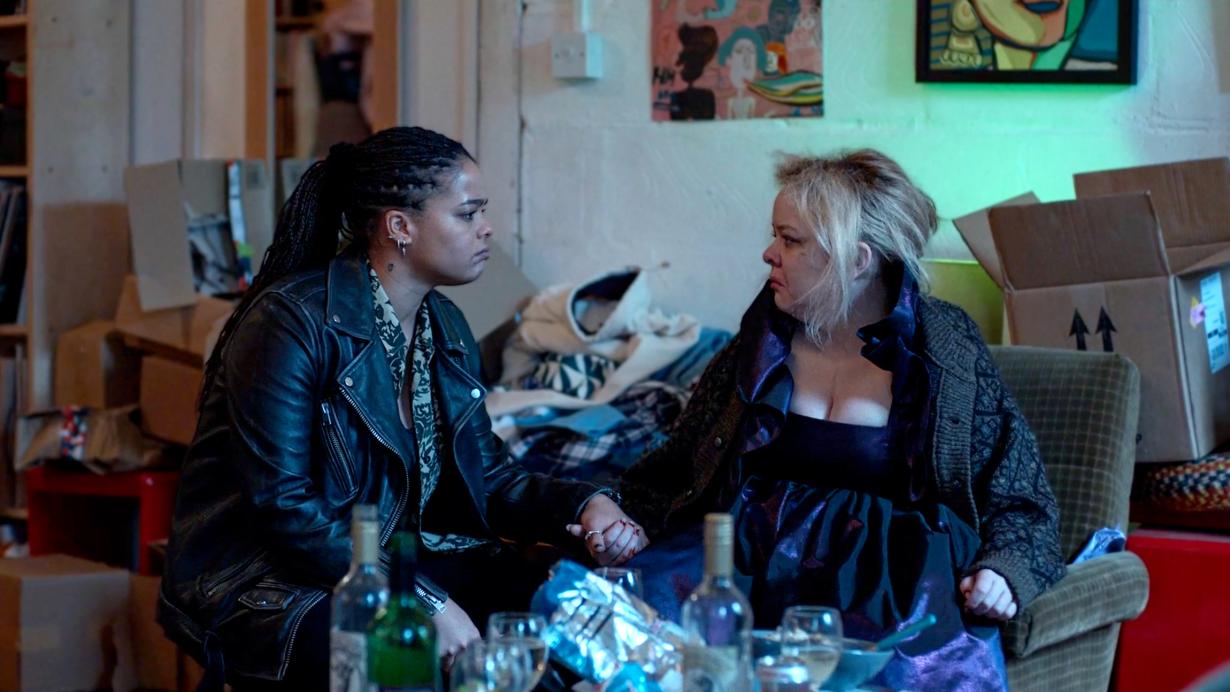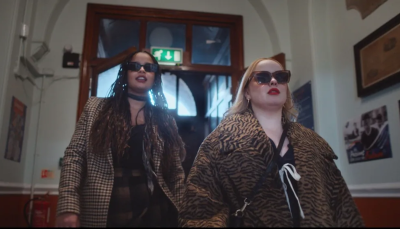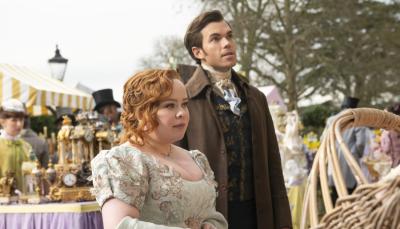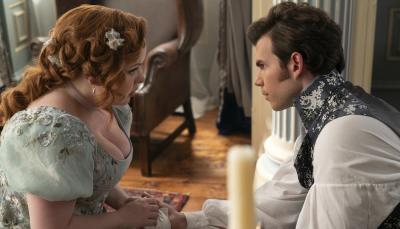Dark Comedy 'Big Mood' Has Big Laughs & Even Bigger Feelings
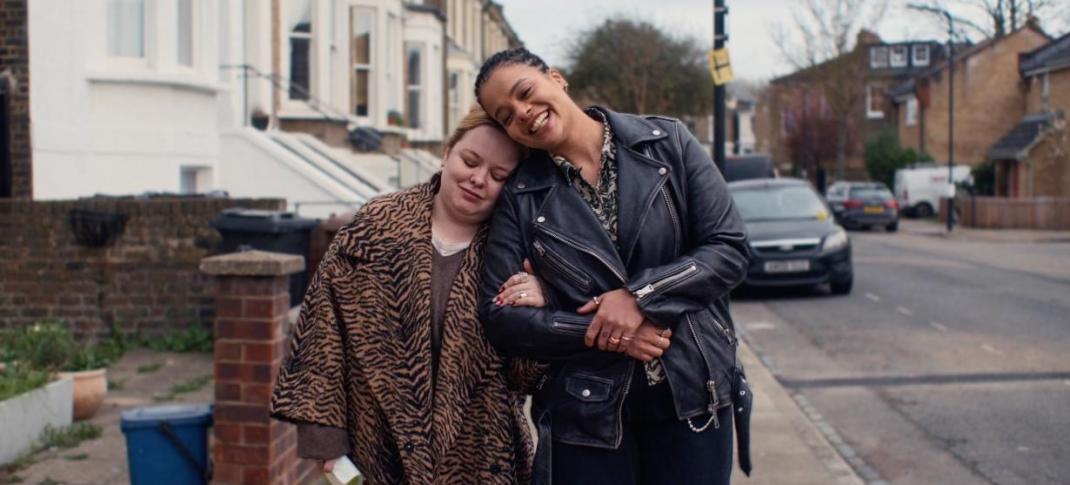
Nicola Coughlan and Lydia West charm viewers as best friend duo Maggie and Eddie in Big Mood.
Channel 4
When a show opens with a montage of Nicola Coughlan glamorously riding an electric scooter through East London set to hyperpop, you know that show is about to be two things: 1) incredible, and 2) made by and for the Gen Z/millennial audience. Thus goes the opening sequence of the dark comedy series Big Mood, starring Nicola Coughlan (Bridgerton) and Lydia West (It’s A Sin). Created by playwright Camilla Whitehill (Porters), Big Mood follows Maggie (Coughlan), a struggling playwright with bipolar disorder, and Eddie (West), Maggie’s best friend and an equally struggling bar owner, trying to keep Maggie from veering off course.
Despite what the premise and promotion of the show might suggest, this is not a goofy comedy in the vein of Girls or Broad City. In tone, it’s a lot like another dark comedy we covered last year, Such Brave Girls. Episodes alternate between hijinks peppered with the struggles of mental illness and stark portrayals of mental illness peppered with uproarious one-liners.
Coughlan and West’s charm makes the show’s emotional whiplash work. Despite often acting like the worst people in the world, both characters are still entirely lovable, primarily thanks to the love they show each other. (Full bias here; they’re two of my favorite actors, and I would gladly watch either of them read the ingredients list on a can of baked beans). Coughlan plays Maggie’s mental health struggles with nuance, and West’s deadpan delivery shines from the show’s most laugh-out-loud lines to its most gut-punch heartbreaking moments. Though Eddie may appear on the surface as the comedic “straight man” and anchor for Maggie, the show beautifully portrays how friendship amidst mental illness isn’t one-sided dependency or caretaking. Maggie and Eddie rely on each other, hurt each other, and heal each other equally.
Though it’s billed as a comedy, Big Mood’s heaviest episodes are heavy. They feel — for the viewer and the characters — like waking nightmares from which there is no escape. Episodes two and three are the most difficult to watch, appropriately sandwiched between the most lighthearted episodes of the bunch. The show no doubt lost some viewers when those episodes failed to deliver on the promise of comedic romps with only a dash of mental illness. But the moments of gravity are real in a way that makes Big Mood stand out from its peers. It puts the pain and frustration of mental illness directly in front of viewers, even when the characters try to shrug it off. (In the throes of a debilitating depressive episode, Maggie tells her agent, “Girlie, I have just been having some, like, mental health stuff.") The people who are willing to see the show through are rewarded with a cathartic blend of hurt and humor.
On the other end of the spectrum, episodes one and four stand out as the most delightful, featuring Maggie (with Eddie’s reluctant help) attempting to hook up with a teacher at her former high school and Maggie and Eddie attending a witchy ceremony in the woods dressed as renaissance-faire-esque “wenches.” Even then, they are haunted by the specter of Maggie’s mental health and Eddie’s rapidly unraveling life.
Big Mood’s best humor and most searing societal critique are perfectly delivered in episode five when Eddie visits a for-profit abortion clinic called #Girlborsh. It’s a striking depiction of how millennial culture dilutes political issues, a trend that most media hasn’t caught up to (or caught on to) yet. Everything about #Girlborsh hits perfectly in the post-Barbie, post- “girl dinner” world. As if the name #Girlborsh and the clinic’s pink, Canva-style decor weren’t enough, the clinic’s slogan, “Hey girlie, you here to exercise your rights?” delivered by a (male) receptionist, hits it out of the park.
Aside from Coughlan and West, the main ingredient in Big Mood’s charm is that it’s absolutely not trying to appeal to anyone outside its target audience. Within the first episode, the protagonists name-check Jedward and reference the Adele Dazeem meme without further explanation. This is a show by and for the Venn diagram of lapsed theater kids and mentally ill millennials. To quote a TikTok adage, the girls that get it, get it. And the girls that don’t, don’t.
Regardless of your generational affiliation, even the most apathetic Gen Zers and the most hardened Boomers would be moved by the finale’s emotional cliffhanger, which demands a second season.
For the girls that get it, all episodes of Big Mood are streaming on Tubi.

